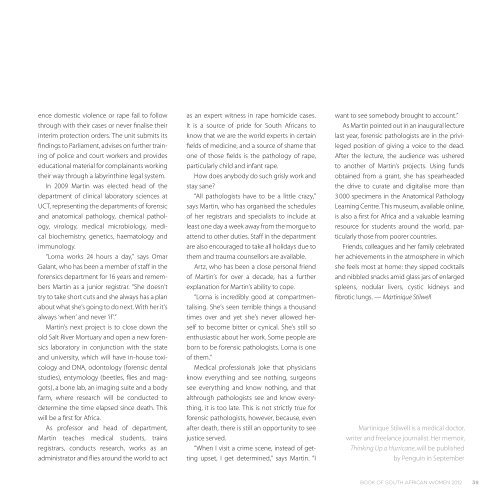Book of South African - Book of Women - Mail & Guardian
Book of South African - Book of Women - Mail & Guardian
Book of South African - Book of Women - Mail & Guardian
You also want an ePaper? Increase the reach of your titles
YUMPU automatically turns print PDFs into web optimized ePapers that Google loves.
ence domestic violence or rape fail to follow<br />
through with their cases or never finalise their<br />
interim protection orders. The unit submits its<br />
findings to Parliament, advises on further training<br />
<strong>of</strong> police and court workers and provides<br />
educational material for complainants working<br />
their way through a labyrinthine legal system.<br />
In 2009 Martin was elected head <strong>of</strong> the<br />
department <strong>of</strong> clinical laboratory sciences at<br />
UCT, representing the departments <strong>of</strong> forensic<br />
and anatomical pathology, chemical pathology,<br />
virology, medical microbiology, medical<br />
biochemistry, genetics, haematology and<br />
immunology.<br />
“Lorna works 24 hours a day,” says Omar<br />
Galant, who has been a member <strong>of</strong> staff in the<br />
forensics department for 16 years and remembers<br />
Martin as a junior registrar. “She doesn’t<br />
try to take short cuts and she always has a plan<br />
about what she’s going to do next. With her it’s<br />
always ‘when’ and never ‘if’.”<br />
Martin’s next project is to close down the<br />
old Salt River Mortuary and open a new forensics<br />
laboratory in conjunction with the state<br />
and university, which will have in-house toxicology<br />
and DNA, odontology (forensic dental<br />
studies), entymology (beetles, flies and maggots),<br />
a bone lab, an imaging suite and a body<br />
farm, where research will be conducted to<br />
determine the time elapsed since death. This<br />
will be a first for Africa.<br />
As pr<strong>of</strong>essor and head <strong>of</strong> department,<br />
Martin teaches medical students, trains<br />
registrars, conducts research, works as an<br />
administrator and flies around the world to act<br />
as an expert witness in rape homicide cases.<br />
It is a source <strong>of</strong> pride for <strong>South</strong> <strong>African</strong>s to<br />
know that we are the world experts in certain<br />
fields <strong>of</strong> medicine, and a source <strong>of</strong> shame that<br />
one <strong>of</strong> those fields is the pathology <strong>of</strong> rape,<br />
particularly child and infant rape.<br />
How does anybody do such grisly work and<br />
stay sane?<br />
“All pathologists have to be a little crazy,”<br />
says Martin, who has organised the schedules<br />
<strong>of</strong> her registrars and specialists to include at<br />
least one day a week away from the morgue to<br />
attend to other duties. Staff in the department<br />
are also encouraged to take all holidays due to<br />
them and trauma counsellors are available.<br />
Artz, who has been a close personal friend<br />
<strong>of</strong> Martin’s for over a decade, has a further<br />
explanation for Martin’s ability to cope.<br />
“Lorna is incredibly good at compartmentalising.<br />
She’s seen terrible things a thousand<br />
times over and yet she’s never allowed herself<br />
to become bitter or cynical. She’s still so<br />
enthusiastic about her work. Some people are<br />
born to be forensic pathologists. Lorna is one<br />
<strong>of</strong> them.”<br />
Medical pr<strong>of</strong>essionals joke that physicians<br />
know everything and see nothing, surgeons<br />
see everything and know nothing, and that<br />
althrough pathologists see and know everything,<br />
it is too late. This is not strictly true for<br />
forensic pathologists, however, because, even<br />
after death, there is still an opportunity to see<br />
justice served.<br />
“When I visit a crime scene, instead <strong>of</strong> getting<br />
upset, I get determined,” says Martin. “I<br />
want to see somebody brought to account.”<br />
As Martin pointed out in an inaugural lecture<br />
last year, forensic pathologists are in the privileged<br />
position <strong>of</strong> giving a voice to the dead.<br />
After the lecture, the audience was ushered<br />
to another <strong>of</strong> Martin’s projects. Using funds<br />
obtained from a grant, she has spearheaded<br />
the drive to curate and digitalise more than<br />
3 000 specimens in the Anatomical Pathology<br />
Learning Centre. This museum, available online,<br />
is also a first for Africa and a valuable learning<br />
resource for students around the world, particularly<br />
those from poorer countries.<br />
Friends, colleagues and her family celebrated<br />
her achievements in the atmosphere in which<br />
she feels most at home: they sipped cocktails<br />
and nibbled snacks amid glass jars <strong>of</strong> enlarged<br />
spleens, nodular livers, cystic kidneys and<br />
fibrotic lungs. — Martinique Stilwell<br />
Martinique Stilwell is a medical doctor,<br />
writer and freelance journalist. Her memoir,<br />
Thinking Up a Hurricane, will be published<br />
by Penguin in September<br />
<strong>Book</strong> <strong>of</strong> <strong>South</strong> AfrICAn women 2012 39


